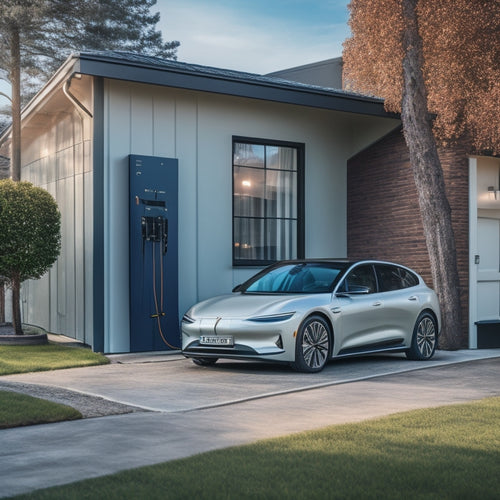
What Are the Benefits of Residential Solar Battery Storage?
Share
By investing in residential solar battery storage, you can access a range of benefits that change your energy usage. You'll achieve energy independence and security by storing excess energy generated by solar panels for nighttime use, reducing reliance on the grid and energy waste. You'll also enjoy cost savings through optimized energy usage, minimized reliance on peak hours, and potentially increased property value. Additionally, you'll enhance your environmental sustainability by reducing your carbon footprint and supporting renewable energy goals. As you investigate this technology further, you'll encounter even more ways it can optimize your energy efficiency and autonomy.
Key Takeaways
- Residential solar battery storage enables energy independence and security by storing excess energy for nighttime use and reducing reliance on the grid.
- It reduces electricity bills and provides financial benefits by optimizing energy usage and minimizing reliance on the grid during peak hours.
- Solar battery storage ensures continuous power supply during grid outages, making it essential for emergency preparedness and safety.
- It contributes to a cleaner, greener lifestyle by maximizing solar panel potential, reducing carbon footprint, and powering homes with clean energy.
- By optimizing energy usage and reducing grid strain, residential solar battery storage enhances energy efficiency and performance, increasing energy autonomy and reducing outage risks.
Reduces Energy Dependence on Grid
With a residential solar battery storage system, you can greatly reduce your energy dependence on the grid. This means you'll have more control over your energy usage and bills.
By storing excess energy generated by your solar panels during the day, you can use it at night or during periods of low sunlight. This reduces your reliance on the grid, providing energy security and contributing to grid resilience.
You'll also benefit from optimized energy usage, as the battery storage system guarantees that the energy you generate is used efficiently. This can lead to significant cost savings, as you'll be using free energy instead of relying on the grid.
In addition, with a residential solar battery storage system, you'll be less affected by fluctuations in grid prices and availability. This provides a sense of energy independence, allowing you to feel more connected to your community while doing your part for the environment.
Provides Backup Power During Outages
By reducing your energy dependence on the grid, you're not only saving money but also setting yourself up for a more reliable energy future.
One of the most significant advantages of residential solar battery storage is its ability to provide backup power during outages. With a solar battery storage system, you can rest easy that your home will remain powered even when the grid goes down.
This feature is especially essential for emergency preparedness, as it guarantees that your critical appliances and systems remain operational. Imagine being able to keep your refrigerator running, your lights on, and your communication devices charged during an extended power outage.
With solar battery storage, you'll have peace of mind knowing that you're prepared for any situation.
In addition to the convenience and comfort it provides, backup power during outages also has significant safety implications. By keeping your home powered, you can avoid the risks associated with extended power outages, such as food spoilage, water contamination, and even carbon monoxide poisoning from generators.
With residential solar battery storage, you can take control of your energy future and stay safe and connected, even when the grid fails.
Increases Property Value Potential
By installing a residential solar battery storage system, you'll not only reduce your carbon footprint but also increase your property's value.
This upgrade can lead to a higher selling price if you decide to sell your home in the future.
As a long-term investment, it's a smart move that can pay off in more ways than one.
Higher Selling Price
As you consider installing a residential solar battery storage system, it's essential to recognize that this upgrade can greatly increase your property's value potential. This is because it provides a unique selling point that sets your home apart from others in the market.
With a solar battery storage system, you can attract more potential buyers and increase your property's marketability.
Here are some ways a solar battery storage system can increase your property's value:
-
Increased buyer attractiveness: A solar battery storage system is a desirable feature that many homebuyers are willing to pay a premium for. This can lead to more offers and a higher selling price for your property.
-
Improved property appeal: A solar battery storage system can enhance your property's appeal, making it more attractive to potential buyers who value energy independence and sustainability.
-
Competitive edge: By installing a solar battery storage system, you can differentiate your property from others in the market, giving you a competitive edge when it comes to selling your home.
Long-Term Investment
How will your residential solar battery storage system impact your property's value in the long run? As a homeowner, you're likely interested in understanding the return on investment (ROI) of your solar battery storage system. The good news is that it can greatly increase your property's value, making it a desirable feature for potential buyers.
A study by the National Renewable Energy Laboratory found that homes with solar panels sell for up to $15,000 more than similar homes without them. By adding a solar battery storage system, you can further enhance your property's appeal and potentially increase its selling price. This is especially true in areas with frequent power outages or high energy costs, where the benefits of energy independence and savings are highly valued.
When considering financing options for your solar battery storage system, keep in mind that many lenders offer specialized loans for energy-efficient upgrades. These loans can help you spread the upfront cost over time, making it more manageable and increasing the likelihood of a strong ROI.
Offers Significant Cost Savings
By installing a residential solar battery storage system, you'll start seeing significant cost savings on your electricity bills.
You'll reduce your reliance on the grid during peak hours, which means you'll pay less for electricity overall.
Additionally, you'll be better equipped to minimize the impact of rate hikes and fluctuations in energy prices.
Lower Electricity Bills
With residential solar battery storage, you can greatly reduce your electricity bills by optimizing your energy usage and reducing your reliance on the grid.
By storing excess energy generated by your solar panels during the day, you can use it to power your home at night or during periods of low sunlight. This approach not only lowers your energy consumption from the grid but also helps to prolong the battery lifespan.
Here are some benefits you can expect:
-
Reduced energy consumption from the grid: With a solar battery storage system, you can rely more on your own generated energy and less on the grid, resulting in lower electricity bills.
-
Optimized energy usage: The system allows you to use excess energy when you need it most, reducing waste and optimizing your energy consumption.
-
Extended battery lifespan: By avoiding deep discharging and reducing the number of charge cycles, you can extend the lifespan of your solar battery, further reducing your energy costs.
Reduce Peak Demand
One significant advantage of residential solar battery storage is that it helps reduce peak demand, an essential factor in slashing your energy costs.
Peak demand occurs when you consume the most electricity, typically during hot summer afternoons when you're running your air conditioner, lights, and appliances simultaneously. By reducing peak demand, you can lower your energy bills and enjoy significant cost savings.
With residential solar battery storage, you can achieve peak shaving and load shifting.
Peak shaving involves reducing your energy consumption during peak hours, while load shifting allows you to shift your energy usage from peak to off-peak hours. This is possible because your solar battery storage system stores excess energy generated by your solar panels during the day and releases it when you need it most, reducing your reliance on the grid during peak hours.
Minimize Rate Hikes
Reducing peak demand is just the beginning of the cost savings you can achieve with residential solar battery storage.
By minimizing your reliance on the grid during peak hours, you can also minimize rate hikes, which can be a significant burden on your finances.
With residential solar battery storage, you can achieve rate stabilization, which is critical for effective financial planning.
Here's how it works:
- You'll pay a lower rate for electricity during off-peak hours, which can be used to charge your solar battery.
- When the grid switches to peak pricing, your solar battery kicks in, providing power to your home and reducing your reliance on the grid.
- As a result, you'll be protected from rate hikes and enjoy significant cost savings over time.
Enhances Energy Independence Benefits
Your energy independence takes a significant leap forward with residential solar battery storage, as it enables you to store excess energy generated by your solar panels during the day for use during the night or on cloudy days. This means you're less reliant on the grid and can enjoy a sense of energy security, knowing you have a backup plan in case of power outages or rate hikes.
With residential solar battery storage, you can:
| Benefits | Description |
|---|---|
| Lifestyle Flexibility | Use stored energy to power your home during peak hours or when the grid is down |
| Energy Security | Reduce reliance on the grid and enjoy backup power during outages |
| Reduced Energy Waste | Store excess energy generated during the day for use at night |
| Increased Autonomy | Take control of your energy usage and reduce your dependence on the grid |
Supports Renewable Energy Goals
Residential solar battery storage aligns seamlessly with your renewable energy goals by maximizing the potential of your solar panel system.
By storing excess energy generated during the day for use at night or during power outages, you're able to reduce your reliance on the grid and decrease your environmental impact. This not only contributes to a cleaner, more sustainable future but also helps you make the most of your investment in renewable resources.
-
You'll reduce your carbon footprint by using stored energy instead of drawing from the grid, which is often powered by fossil fuels.
-
You'll be able to power your home with clean energy even when the sun isn't shining, reducing your reliance on non-renewable energy sources.
-
By optimizing your energy usage and reducing waste, you'll be doing your part to minimize your environmental impact and promote a healthier planet for future generations.
Improves Energy Efficiency Overall
With energy efficiency in mind, residential solar battery storage takes your renewable energy system to the next level by streamlining your energy usage. By storing excess energy generated during the day, you can reduce your reliance on the grid and minimize energy waste. This not only saves you money on your electricity bills but also reduces your carbon footprint.
| Energy Efficiency Benefits | Description |
|---|---|
| Optimized Energy Usage | Energy storage allows you to use stored energy during peak hours, reducing your energy consumption from the grid. |
| Reduced Energy Waste | Excess energy generated during the day is stored for later use, minimizing energy waste. |
| Improved Load Management | Energy storage helps manage energy loads, reducing strain on the grid and preventing power outages. |
| Enhanced Energy Autonomy | With energy storage, you have more control over your energy usage, making you less dependent on the grid. |
| Increased Property Value | Energy-efficient homes with solar battery storage systems increase property value and appeal. |
Increases Solar Panel Efficiency
Increases Solar Panel Efficiency
Solar panels work at their best when the sun shines brightly, but their efficiency drops during periods of low sunlight or when the grid is down. This is where residential solar battery storage comes in. By storing excess energy generated during peak hours, you can optimize your solar energy management and guarantee a steady supply of power throughout the day.
This, in turn, increases the overall efficiency of your solar panels.
- You can store excess energy generated during the day for use during the night or when the grid is down.
- This reduces the strain on your solar panels, increasing their lifespan and reducing maintenance costs.
- By storing energy and using it when needed, you can prolong the battery longevity of your solar battery storage system.
Reduces Carbon Footprint Effectively
One of the most significant advantages of residential solar battery storage is that it reduces your carbon footprint effectively. By utilizing and storing solar energy, you're decreasing your reliance on the grid, which is often powered by fossil fuels. This means you're producing fewer greenhouse gas emissions, contributing less to climate change, and helping to create a more sustainable future.
In essence, you're taking an essential step towards sustainable living. With residential solar battery storage, you can store excess energy generated during the day for use at night or during power outages. This reduces your carbon footprint reduction and helps you achieve a cleaner, greener lifestyle.
Frequently Asked Questions
Can I Use a Residential Solar Battery Storage System With an Existing Solar Panel Setup?
You can seamlessly integrate a residential solar battery storage system with your existing solar panel setup, achieving enhanced energy independence by storing excess energy generated during the day for later use, optimizing your solar panel integration.
How Long Does a Typical Residential Solar Battery Storage System Last?
As you traverse the world of renewable energy, you're probably wondering how long your residential solar battery storage system will last. Typically, a battery's lifespan ranges from 10 to 15 years, depending on storage capacity, with some lasting up to 20 years or more.
Are Solar Battery Storage Systems Prone to Overheating or Fires?
You'll be relieved to know that solar battery storage systems are designed with overheating risks in mind, incorporating fire prevention measures like thermal management, ventilation, and protective casings to minimize the risk of overheating and fires.
Can I Charge My Electric Vehicle With a Residential Solar Battery Storage System?
As you ride into the sustainable future, you'll be thrilled to know you can charge your electric vehicle with a residential solar battery storage system, ensuring peak charging efficiency and seamless battery compatibility, making eco-friendly commuting a breeze.
Do Solar Battery Storage Systems Require Regular Maintenance or Upkeep?
You'll be relieved to know that solar battery storage systems require minimal maintenance, ensuring a long battery lifespan and keeping maintenance costs low, so you can focus on enjoying the benefits of your sustainable energy solution.
Conclusion
As you consider upgrading to residential solar battery storage, it's noteworthy that it's not just a smart investment, but a coincidence that it also aligns with your values of reducing your carbon footprint and gaining energy independence. By doing so, you'll not only reap the benefits of cost savings and increased property value, but you'll also be contributing to a cleaner, more sustainable future - a coincidence that will likely bring you a sense of accomplishment and satisfaction.
Related Posts
-

Why Higher Upfront Costs Are Worth It
You pay a premium for high-quality, energy-efficient products, but they're worth it. With durability testing ensuring...
-

5 Essential Tips for Buying EV Charging Systems Online
When purchasing an EV charging system online, you'll want to make sure you're making an informed decision. First, det...
-

What Role Do Unicycles Play in Urban Transport?
As you navigate through congested city streets, unicycles emerge as a viable solution, slashing carbon emissions by u...


